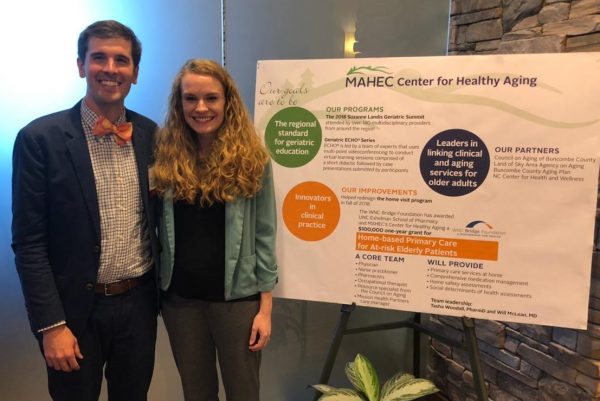November 18, 2020

If not us, then who?
Western North Carolina is “older, sicker and poorer” than state and national averages. And it also lacks a center of excellence to comprehensively address the clinical and social challenges that older adults face in the region, said Tasha Woodall, Pharm.D.
“If we don’t step in to fill this void and help our older adults age according to their wishes, then who will?” Woodall said. Woodall is an associate professor of clinical education at the UNC Eshelman School of Pharmacy’s Asheville Campus, and Associate Director of Pharmacotherapy for Geriatrics at the Mountain Area Health Education Center.
She’s also a champion for older adults.
Standing up for health, happiness and safety of older adults
With the knowledge of the region’s health disparities, Woodall and colleague William McLean, MD, both co-directors of The Suzanne Landis Center for Healthy Aging, are on a mission to provide a meaningful impact on the health, happiness and safety of older adults in Western North Carolina.
They aim to do so with the support of a recent $330,000 gift from The Deerfield Charitable Foundation.
“We so appreciate the Foundation’s recognition of the importance of this work and their willingness to support our time and efforts at making an impact in this area,” Woodall said.
Woodall said she and McLean have identified three aims to help guide their work for improving the lives of older adults in WNC: Geriatric education; community partnerships; and clinical innovation.
“The incredible generosity of the grant gives us the opportunity to mature our programs, prove the worth of interdisciplinary partnerships, and improve the well-being of the older adults of Western North Carolina,” McLean added.
Geriatric Education
Through geriatric education, they aim to host yearly teaching and mentoring series via teleconference to link geriatric providers at academic hubs with primary care clinicians across WNC.
They also hope to increase the pipeline of clinical providers caring for older adults, particularly those of color, and support existing locally focused conferences aimed at wellness and prevention in older adults.
Community Partnerships
To lead the community in linking clinical and aging services, Woodall said they plan to sustain current roles within the interorganizational Active Aging Center for Buncombe County, Elder Justice Coalition, and Housing Options for Aging in Place Committee of the Buncombe County Aging Plan.
They also plan to expand partnerships into surrounding counties, with a vision of growing regionally, and continue the Annual Suzanne Landis Geriatric Summit with a focus on convening the clinical and aging services communities.
Clinical Innovation
To further innovate in clinical practice, Woodall said they will work to expand and mature the Home Based Primary Care (HBPC) program to benefit not only high-risk older adults, but also lower-risk older adults in WNC, “upstream” of need. This expansion will be supported by a $100,000 grant from the WNC Bridge Foundation, the second the Center for Healthy Aging has received from this foundation.
In addition, the team will disseminate HBPC by supporting development of teams in other counties and sharing best practices, so as to better support the needs of rural populations and explore partnerships to support housing opportunities across the spectrum of need.
Lastly, they aim to advocate for alternative models of payment for care of older adults that emphasize higher quality, lower cost, and improved patient-provider experience.
Educating future healthcare leaders on geriatric pharmacotherapy
In addition to this work, Woodall also coordinates the School of Pharmacy’s geriatrics elective course and directs a PGY2 specialty residency in geriatrics.
She is currently working on a research project to identify the misperceptions that student pharmacists have about geriatric practice as a means of breaking down those barriers and ensuring the School develops a strong workforce with skills in geriatric pharmacotherapy.
“We have a disproportionate share of seniors in Western North Carolina and often they are underserved,” said Mollie Scott, the School’s regional associate dean on the Asheville campus. “Through Tasha’s leadership, MAHEC is improving the lives of our older adults. I am so excited for her and this new gift!”
Latest News

Dean Angela Kashuba receives Carolina Alumni Faculty Service Award

RASP poster presentations capture student research


